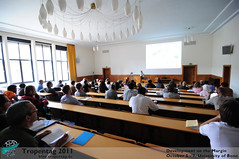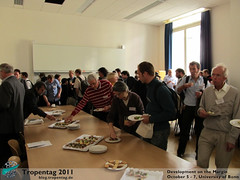Blogs
At the kitchen table: Estelle Berset
Fri, 10/07/2011 - 11:48 — De-Registered User
Scientists are often blamed for living in a ‘scientific bubble’. It’s one thing to talk amongst fellow scientists about a certain research topics and have thorough discussions, but if scientists are not able to communicate their results with people that are not into the topic, their research loses its value. Therefore, we invited two speakers to explain their research as if they were talking to my mum at the kitchen table, who has, besides her own home garden, nothing to do with agricultural research on ‘soil fertility and nutrient cycling’. In part I we present Estelle Berset.
 Estelle Berset
Although the title of the presentation on ‘Effects of Mycorrhiza (AMF) and Plant Growth Promoting Rhizo-bacteria (PGPR) Inoculants on Rice Crops in Northern India’ did not immediately appeal to me, Estelle Berset, scientific collaborator at FiBL (Research Institute of Organic Agriculture) in Frick, was a pleasant surprise between all those men during the session ‘soil fertility and nutrient cycling’. Is she able to explain her research in ‘normal words’?
Can you explain what your research is about?
Estelle Berset
Although the title of the presentation on ‘Effects of Mycorrhiza (AMF) and Plant Growth Promoting Rhizo-bacteria (PGPR) Inoculants on Rice Crops in Northern India’ did not immediately appeal to me, Estelle Berset, scientific collaborator at FiBL (Research Institute of Organic Agriculture) in Frick, was a pleasant surprise between all those men during the session ‘soil fertility and nutrient cycling’. Is she able to explain her research in ‘normal words’?
Can you explain what your research is about?
 Estelle Berset
Although the title of the presentation on ‘Effects of Mycorrhiza (AMF) and Plant Growth Promoting Rhizo-bacteria (PGPR) Inoculants on Rice Crops in Northern India’ did not immediately appeal to me, Estelle Berset, scientific collaborator at FiBL (Research Institute of Organic Agriculture) in Frick, was a pleasant surprise between all those men during the session ‘soil fertility and nutrient cycling’. Is she able to explain her research in ‘normal words’?
Can you explain what your research is about?
Estelle Berset
Although the title of the presentation on ‘Effects of Mycorrhiza (AMF) and Plant Growth Promoting Rhizo-bacteria (PGPR) Inoculants on Rice Crops in Northern India’ did not immediately appeal to me, Estelle Berset, scientific collaborator at FiBL (Research Institute of Organic Agriculture) in Frick, was a pleasant surprise between all those men during the session ‘soil fertility and nutrient cycling’. Is she able to explain her research in ‘normal words’?
Can you explain what your research is about?
To Feed or not to Feed?
Fri, 10/07/2011 - 11:25 — De-Registered User
The Tropentag 2011 Thematic Presentations on Animal Production Systems discuss various trade-offs between different animal feeds and feeding practices. The livestock in question ranged from cattle to shrimp and even guinea pigs!
 Presentations on Animal Production Systems at Tropentag 2011.
Transforming to Integrated Ecosystems
The common thread through all the presentations was how to integrate livestock production into the natural environment. Sustainable aquaculture that aims at minimizing impact on the environment can in the long run provide farmers with much better livelihoods. We were presented with some great use of Google map imaging depicting the boundaries of land usage and how livestock production can be integrated without degrading the environments around it. A ratio between environmental land coverage and live stock land usage enforces the ongoing theme of 'doing more with less'.
Presentations on Animal Production Systems at Tropentag 2011.
Transforming to Integrated Ecosystems
The common thread through all the presentations was how to integrate livestock production into the natural environment. Sustainable aquaculture that aims at minimizing impact on the environment can in the long run provide farmers with much better livelihoods. We were presented with some great use of Google map imaging depicting the boundaries of land usage and how livestock production can be integrated without degrading the environments around it. A ratio between environmental land coverage and live stock land usage enforces the ongoing theme of 'doing more with less'.
 Presentations on Animal Production Systems at Tropentag 2011.
Transforming to Integrated Ecosystems
The common thread through all the presentations was how to integrate livestock production into the natural environment. Sustainable aquaculture that aims at minimizing impact on the environment can in the long run provide farmers with much better livelihoods. We were presented with some great use of Google map imaging depicting the boundaries of land usage and how livestock production can be integrated without degrading the environments around it. A ratio between environmental land coverage and live stock land usage enforces the ongoing theme of 'doing more with less'.
Presentations on Animal Production Systems at Tropentag 2011.
Transforming to Integrated Ecosystems
The common thread through all the presentations was how to integrate livestock production into the natural environment. Sustainable aquaculture that aims at minimizing impact on the environment can in the long run provide farmers with much better livelihoods. We were presented with some great use of Google map imaging depicting the boundaries of land usage and how livestock production can be integrated without degrading the environments around it. A ratio between environmental land coverage and live stock land usage enforces the ongoing theme of 'doing more with less'.
"Increase production on all levels" and let the mass develop working solutions. Keynote Discussion Part 3/3
Fri, 10/07/2011 - 10:51 — De-Registered UserThe myths and realities of Biological Pest Control
Fri, 10/07/2011 - 09:23 — De-Registered User A commonly held opinion when talking about traditional biological control, is that it is difficult to find successful stories without undesirable side effects. Prof. Christian Borgemeister from the International Center of Insect Physiology and insect Ecology (ICIPE) believes the contrary and he even challenged the audience to give him a recent example of biological control that “went out of control”.
“Yes”, he added, “only in the best case scenarios traditional bio-control (BC) works as a stand-alone solution and often it has to be combined with other compatible and “bio-rational” interventions. However, we cannot deny that insects and other organisms deliver a critical environmental service in terms of pest control. ” The problem seems to be that the discussion about BC has been dominated by early mistakes while successfully improved techniques are overlooked; or in the words of Prof. Borgemeister “there is a gap between myths and reality”.
Bio-control on the margin
A commonly held opinion when talking about traditional biological control, is that it is difficult to find successful stories without undesirable side effects. Prof. Christian Borgemeister from the International Center of Insect Physiology and insect Ecology (ICIPE) believes the contrary and he even challenged the audience to give him a recent example of biological control that “went out of control”.
“Yes”, he added, “only in the best case scenarios traditional bio-control (BC) works as a stand-alone solution and often it has to be combined with other compatible and “bio-rational” interventions. However, we cannot deny that insects and other organisms deliver a critical environmental service in terms of pest control. ” The problem seems to be that the discussion about BC has been dominated by early mistakes while successfully improved techniques are overlooked; or in the words of Prof. Borgemeister “there is a gap between myths and reality”.
Bio-control on the margin
"What you're calling marginal is political opposition" Keynote Discussion Part 2/3
Fri, 10/07/2011 - 09:06 — De-Registered UserBiodiversity in the center of development
Thu, 10/06/2011 - 18:22 — De-Registered User
Tropentag 2011 brings together prominent researchers and thinkers alike to discuss and exchange the challenges of development on the margin. Food security, rural incomes and livelihood diversification are in the core of the debate, while the conservation of biodiversity and the valuation of ecosystem services attract more and more attention.
With a special invited paper on Resource use and ecosystem services by Christian Borgemeister from ICIPE, this session highlighted that the conservation of biodiversity does not have to exclude economic opportunities, but at the same time its success is vulnerable to various risks.
 Christian Borgemeister, ICIPE
Christian Borgemeister, ICIPE
 Christian Borgemeister, ICIPE
Christian Borgemeister, ICIPE
GIZ underscores the need for using Conventions to support Sustainable Land Management in fragile systems
Thu, 10/06/2011 - 18:03 — De-Registered User
Introduction by Dr. Stefan Schmitz:
In introducing the session, he said that the talk is focussed on marginality, fragility, uncertainty, instability, food security and rural development.
Crisis at the horn of Africa but also experiences from all over the world are major issues of worry and of priority to GIZ. He stated that various aspects of national key sectors come together (e.g cultural, political, environmental etc) and need attention by development agencies. Do all these dimentions of fragility interlink or are they independent? We should link evidence base, research base, scientific base etc., with political situations which is what GIZ is doing.
Anneke Trux then spoke on the topic “How can UNCCD and other UN Conventions support and enable sustainable land management in fragile systems?”
She started by answering the questions; What is a convention? and What does a convention regulate? She explained that a convention is a treaty among different countries, is an internatinoal legal framework, and that even though it is not a law, partners agree to the terms and aims. A convention regulates strategies, obligations, aims and objectives. She emphasized that since conventions are not laws, the commitment of parties is a major obstacle for implementation.
Jobs opportunities or finding potential candidates?
Thu, 10/06/2011 - 17:41 — De-Registered User
As every year, the meeting of “Friends of CGIAR” took place in Tropentag 2011. "This public event is a great opportunity for networking, job opportunities and update of current news of the 15 centers of the Consultive Group on International Agricultural Research, CGIAR” said Prof. Dr. Asch, University of Hohenheim.
 Brigitte L. Maass, from CIAT- International Centre for Tropical Agriculture-, speaking in four languages showed her friendly predisposition for contacting with researches from everywhere. She is an agronomist specialized in forage. She was talking with Erica, a Colombian student who is making his master in Germany. Erica was asking for potential field work “I want to make my field work in Colombia for my thesis”. Brigitte was working in Colombia for many years as a young scientists. And now, she is located in Nairoby, Kenia. Something will work out of this meeting!
Brigitte L. Maass, from CIAT- International Centre for Tropical Agriculture-, speaking in four languages showed her friendly predisposition for contacting with researches from everywhere. She is an agronomist specialized in forage. She was talking with Erica, a Colombian student who is making his master in Germany. Erica was asking for potential field work “I want to make my field work in Colombia for my thesis”. Brigitte was working in Colombia for many years as a young scientists. And now, she is located in Nairoby, Kenia. Something will work out of this meeting!
 Brigitte L. Maass, from CIAT- International Centre for Tropical Agriculture-, speaking in four languages showed her friendly predisposition for contacting with researches from everywhere. She is an agronomist specialized in forage. She was talking with Erica, a Colombian student who is making his master in Germany. Erica was asking for potential field work “I want to make my field work in Colombia for my thesis”. Brigitte was working in Colombia for many years as a young scientists. And now, she is located in Nairoby, Kenia. Something will work out of this meeting!
Brigitte L. Maass, from CIAT- International Centre for Tropical Agriculture-, speaking in four languages showed her friendly predisposition for contacting with researches from everywhere. She is an agronomist specialized in forage. She was talking with Erica, a Colombian student who is making his master in Germany. Erica was asking for potential field work “I want to make my field work in Colombia for my thesis”. Brigitte was working in Colombia for many years as a young scientists. And now, she is located in Nairoby, Kenia. Something will work out of this meeting!




